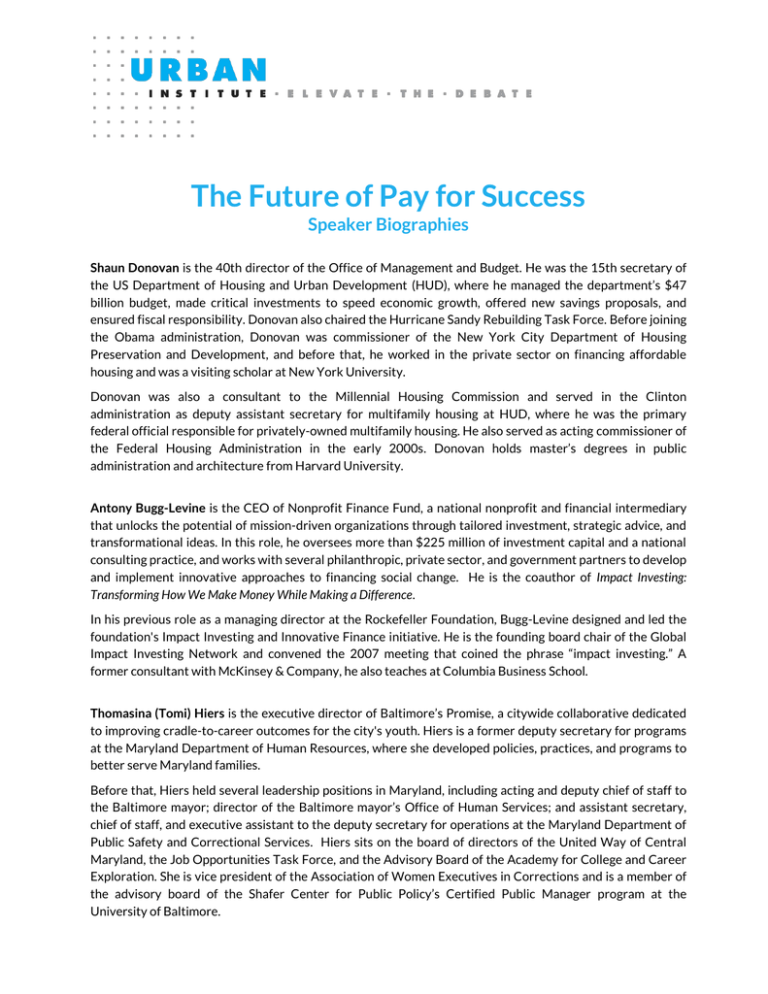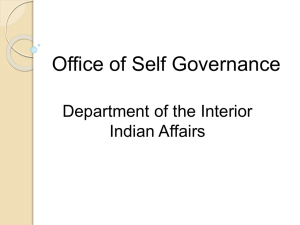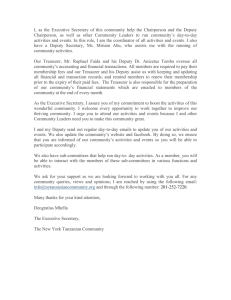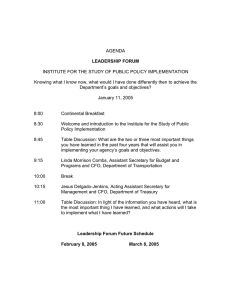The Future of Pay for Success Speaker Biographies
advertisement

The Future of Pay for Success Speaker Biographies Shaun Donovan is the 40th director of the Office of Management and Budget. He was the 15th secretary of the US Department of Housing and Urban Development (HUD), where he managed the department’s $47 billion budget, made critical investments to speed economic growth, offered new savings proposals, and ensured fiscal responsibility. Donovan also chaired the Hurricane Sandy Rebuilding Task Force. Before joining the Obama administration, Donovan was commissioner of the New York City Department of Housing Preservation and Development, and before that, he worked in the private sector on financing affordable housing and was a visiting scholar at New York University. Donovan was also a consultant to the Millennial Housing Commission and served in the Clinton administration as deputy assistant secretary for multifamily housing at HUD, where he was the primary federal official responsible for privately-owned multifamily housing. He also served as acting commissioner of the Federal Housing Administration in the early 2000s. Donovan holds master’s degrees in public administration and architecture from Harvard University. Antony Bugg-Levine is the CEO of Nonprofit Finance Fund, a national nonprofit and financial intermediary that unlocks the potential of mission-driven organizations through tailored investment, strategic advice, and transformational ideas. In this role, he oversees more than $225 million of investment capital and a national consulting practice, and works with several philanthropic, private sector, and government partners to develop and implement innovative approaches to financing social change. He is the coauthor of Impact Investing: Transforming How We Make Money While Making a Difference. In his previous role as a managing director at the Rockefeller Foundation, Bugg-Levine designed and led the foundation's Impact Investing and Innovative Finance initiative. He is the founding board chair of the Global Impact Investing Network and convened the 2007 meeting that coined the phrase “impact investing.” A former consultant with McKinsey & Company, he also teaches at Columbia Business School. Thomasina (Tomi) Hiers is the executive director of Baltimore’s Promise, a citywide collaborative dedicated to improving cradle-to-career outcomes for the city's youth. Hiers is a former deputy secretary for programs at the Maryland Department of Human Resources, where she developed policies, practices, and programs to better serve Maryland families. Before that, Hiers held several leadership positions in Maryland, including acting and deputy chief of staff to the Baltimore mayor; director of the Baltimore mayor’s Office of Human Services; and assistant secretary, chief of staff, and executive assistant to the deputy secretary for operations at the Maryland Department of Public Safety and Correctional Services. Hiers sits on the board of directors of the United Way of Central Maryland, the Job Opportunities Task Force, and the Advisory Board of the Academy for College and Career Exploration. She is vice president of the Association of Women Executives in Corrections and is a member of the advisory board of the Shafer Center for Public Policy’s Certified Public Manager program at the University of Baltimore. Ben McAdams became Salt Lake County mayor in January 2013. Under his leadership, the county became the first in the country to partner with the private sector to offer greater access to high-quality preschool for lowincome children. McAdams has also emphasized economic development and job growth, partnering with cities to attract business while being a careful steward of taxpayer dollars. He has also supported greater access for businesses and residents to transit, trails, and open space. McAdams is a graduate of the University of Utah and Columbia Law School, and he is a former corporate finance attorney. Erika Poethig is an Institute fellow and director of urban policy initiatives at the Urban Institute. Poethig assembles in-house experts to help local leaders draw insights from research and navigate policy challenges facing urban America. She also leads partnerships to develop new programs and strategies, translate research into policy and practice, and align philanthropic investments and federal policy. Before joining Urban in 2013, Poethig was acting assistant secretary for policy, development, and research at the US Department of Housing and Urban Development. During her tenure in the Obama administration, she also served as deputy assistant secretary for policy development and was a leading architect of the White House Council for Strong Cities and Strong Communities. At the John D. and Catherine T. MacArthur Foundation, she was associate director for housing. She was also assistant commissioner for policy, resource, and program development at the City of Chicago's Department of Housing. In the late 1990s, she developed Mayor Richard M. Daley's campaign to combat predatory lending, prevent foreclosures, and stabilize communities. Previously, she was associate project director of the Metropolis Project, which produced the Metropolis 2020 agenda for regional leadership around the major issues faced by the metropolitan Chicago area. Poethig was a Phi Beta Kappa member at the College of Wooster, a Fulbright Scholar at the University of Vienna, and has an MA with honors in public policy from the University of Chicago. John Roman is a senior fellow in the Policy Advisory Group and the Justice Policy Center at the Urban Institute, where he evaluates innovative crime control policies and justice programs. Roman currently directs several studies funded by the National Institute of Justice, including two randomized trials of the costs and benefits of using of DNA in motor vehicle thefts and burglary investigations, a study investigating why forensic evidence is rarely used by law enforcement to identify unknown offenders, and a study on wrongful conviction. He also adapts social impact bonds to public safety reform efforts for the Bureau of Justice Assistance and evaluates the Juvenile Justice Reform and Reinvestment Initiative for the Office of Juvenile Justice and Delinquency Prevention. Roman is the coeditor of Cost-Benefit Analysis and Crime Control and Juvenile Drug Courts and Teen Substance Abuse. He has written dozens of scholarly articles and book chapters, and he is a regular contributor to CityLab and the Huffington Post. Roman is a lecturer at the University of Pennsylvania and an affiliated professor at Georgetown University. Sonal Shah is professor and founding executive director of the Beeck Center for Social Impact and Innovation at Georgetown University. She is an economist and entrepreneur focused on actionable innovation in the public and private sectors. Most recently, she was the deputy assistant to the President and founding director of the White House Office of Social Innovation and Civic Participation She spent seven years at the US Department of the Treasury, where she was an international economist working on timely development issues, including post-conflict development in Bosnia, the Asian financial crisis, and poverty reduction in Africa. From there, she worked for Goldman Sachs and Google while she cofounded Indicorps, a nonprofit working to build a new generation of socially conscious global leaders. She is a senior fellow at the Case Foundation and the Center for American Progress. Sonal serves on the boards of Oxfam, Urban Alliance, GSMA Foundation, and the Century Foundation, and she is a former chair of the G7/G8 taskforce on Impact Investing. Sarah Rosen Wartell became the third president of the Urban Institute in February 2012. A public policy executive and housing markets expert, she was deputy assistant to the president for economic policy and deputy director of the National Economic Council. At the US Department of Housing and Urban Development from 1993 to 1998, she advised the federal housing commissioner on housing finance, mortgage markets, and consumer protection. In 2012, she was named a “Woman of Influence” by HousingWire. Wartell cofounded the Center for American Progress, serving as its first chief operating officer and general counsel. Later, as executive vice president, she oversaw its policy teams and fellows. Her work focused on the economy and housing markets, and she directed the Mortgage Finance Working Group and "Doing What Works" government performance program. She previously practiced law with the Washington, DC, firm Arnold & Porter and was a consultant to the bipartisan Millennial Housing Commission. Wartell currently serves on the boards of the Low Income Investment Fund, Center for Law and Social Policy, and Center for Urban Science and Progress at New York University. She is also a Penn Institute for Urban Research Scholar. Her areas of expertise include community development, consumer finance, asset building, and housing finance. Wartell has an AB degree with honors in urban affairs from Princeton University's Woodrow Wilson School of Public and International Affairs and a JD degree from Yale Law School.





![August 20, 1986 SG/94/86 D-08 From: The Secretary General [*] To](http://s3.studylib.net/store/data/007822023_2-1a5272e9a5af1caa9930908b70495ac3-300x300.png)
